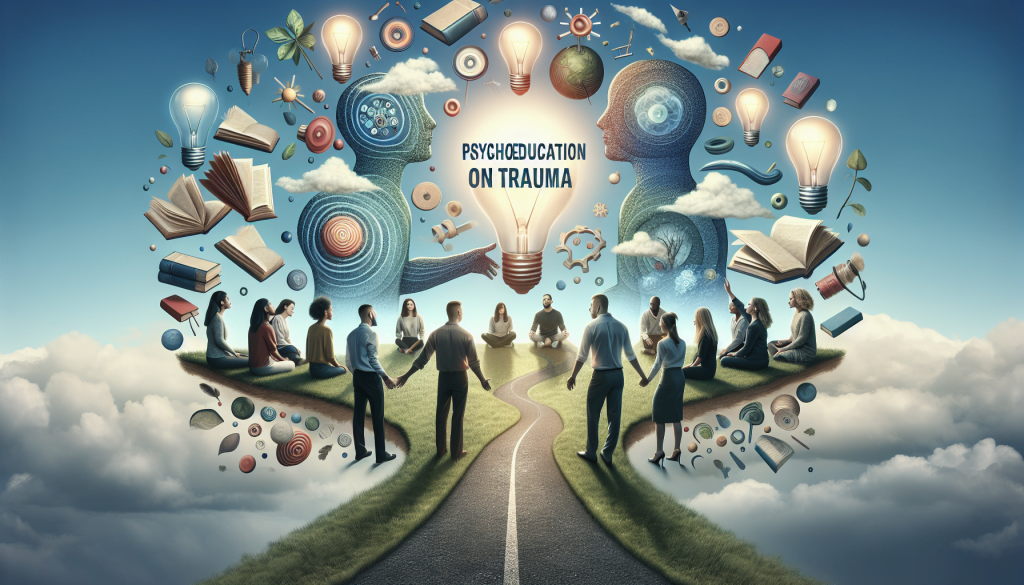Psychoeducation on trauma is a powerful tool that can significantly improve the long-term outcomes for survivors. It provides survivors with a comprehensive understanding of their experiences, equips them with coping strategies, and empowers them to take an active role in their recovery. This blog post delves into the transformative impact of psychoeducation on trauma survivors and how it fosters resilience and healing over time.
Key Takeaways
- Psychoeducation demystifies trauma and its effects, enabling survivors to understand their experiences.
- It equips survivors with practical coping strategies and promotes active participation in their recovery.
- Psychoeducation enhances professional support by educating healthcare staff about trauma.
- It plays a crucial role in integrating mental and behavioral health in trauma recovery.
- Psychoeducation aids survivors of family violence in utilizing support services effectively.
- The long-term benefits of psychoeducation include sustained healing, resilience, and improved quality of life.
Introduction to Psychoeducation for Trauma Recovery
Definition and Purpose of Psychoeducation
Psychoeducation is a therapeutic approach that combines education and psychology to help individuals understand and manage their mental health conditions. In the context of trauma, psychoeducation provides survivors with a comprehensive understanding of their experiences, the nature of trauma, and its impact on their lives. It equips them with practical coping strategies, promotes active participation in their recovery, and empowers them to advocate for themselves.
Overview of Benefits for Trauma Survivors
Psychoeducation offers numerous benefits for trauma survivors. It demystifies trauma, reduces feelings of isolation, and fosters a sense of control over one’s recovery. By equipping survivors with knowledge and coping strategies, psychoeducation promotes resilience and healing over time.

Understanding Trauma Across Different Life Stages
Psychoeducation for Child Trauma
Recognizing signs of trauma in preschool to high school children
Children who have experienced trauma may exhibit a range of signs, including changes in behavior, mood, and academic performance. Psychoeducation helps parents, caregivers, and teachers recognize these signs and respond appropriately. source
Tailoring age-appropriate recovery strategies
Psychoeducation also guides professionals in tailoring age-appropriate recovery strategies for children. These strategies may include play therapy, art therapy, and cognitive-behavioral therapy.

Addressing Adult Survivors of Childhood Trauma
Understanding complex trauma and needs
Adult survivors of childhood trauma often grapple with complex trauma, which involves multiple traumatic events that occur within a caregiving relationship. Psychoeducation helps these survivors understand their experiences and the unique challenges they face. source
Specialized knowledge and coping strategies for healing
Psychoeducation provides adult survivors with specialized knowledge and coping strategies for healing. It empowers them to take an active role in their recovery and seek appropriate support.

Enhancing Professional Support Through Psychoeducation
Psychoeducation for Healthcare Staff
Improving understanding of trauma’s impact
Psychoeducation can enhance the quality of care provided by healthcare staff by improving their understanding of trauma’s impact. It equips them with the knowledge to provide empathetic and informed care.

Providing empathetic and informed care
Through psychoeducation, healthcare staff can learn to provide care that is sensitive to the needs of trauma survivors. This includes understanding the survivor’s perspective, validating their experiences, and providing support in a non-judgmental manner.

Empowering Survivors Through Knowledge
Psychoeducation for Personal Empowerment
Encouraging active participation in recovery
Psychoeducation empowers survivors to take an active role in their recovery. By understanding their trauma and its effects, survivors can make informed decisions about their treatment and recovery process.

Equipping survivors to advocate for themselves and seek resources
Psychoeducation also equips survivors to advocate for themselves and seek resources. It provides them with the knowledge and confidence to navigate the healthcare system and access the support they need.

Integrating Mental and Behavioral Health in Trauma Recovery
Mental Health and Substance Use Recovery
Understanding the interconnection with trauma
Many trauma survivors struggle with mental health issues and substance use disorders. Psychoeducation helps survivors understand the interconnection between trauma and these issues, guiding them towards healthier behaviors and emotions. source
Guiding survivors towards healthier behaviors and emotions
Psychoeducation provides survivors with strategies to manage their emotions and behaviors in a healthy way. This includes techniques for stress management, emotion regulation, and substance use recovery.

Applied Behavior Analysis (ABA) and Trauma
Behavioral techniques to support trauma recovery
Applied Behavior Analysis (ABA) is a therapeutic approach that uses behavioral techniques to support trauma recovery. Psychoeducation can enhance the effectiveness of ABA by providing survivors with a clear understanding of their behaviors and how to change them.

Support Services for Survivors of Family Violence
Overview of Available Support Mechanisms
Temporary shelter and ongoing support services
Survivors of family violence often require a range of support services, including temporary shelter, counseling, and legal assistance. Psychoeducation can help survivors understand these services and how to access them. source
Role of Psychoeducation in Utilizing Support Services
Providing practical steps towards safety and recovery
Psychoeducation plays a crucial role in helping survivors of family violence utilize support services effectively. It provides them with practical steps towards safety and recovery, empowering them to take control of their lives.

Long-Term Benefits of Psychoeducation for Trauma Survivors
Sustained Healing and Resilience
Psychoeducation promotes sustained healing and resilience among trauma survivors. By equipping survivors with knowledge and coping strategies, it fosters long-term recovery and resilience.

Improved Quality of Life and Well-being
Psychoeducation also contributes to improved quality of life and well-being among trauma survivors. It empowers survivors to manage their symptoms, engage in healthy behaviors, and build supportive relationships, leading to a better quality of life.
Conclusion
Recap of the Importance of Psychoeducation in Trauma Recovery
Psychoeducation is a powerful tool in trauma recovery. It demystifies trauma, equips survivors with coping strategies, and empowers them to take an active role in their recovery. The long-term benefits of psychoeducation include sustained healing, resilience, and improved quality of life.
Encouragement for Continued Education and Support
Continued education and support are crucial for trauma survivors. Whether you are a survivor, a caregiver, or a healthcare professional, we encourage you to continue learning about trauma and its effects. Together, we can foster resilience and healing among trauma survivors.

For more information on psychoeducation and trauma recovery, visit our pages on psychoeducation on trauma, the impact of trauma-focused therapy on PTSD symptoms, and building resilience and coping skills. If you or someone you know is in need of support, consider exploring our counseling and therapy services.
Unlocking Healing: How Psychoeducation on Trauma Benefits Survivors in the Long Run – FAQ
What is psychoeducation in the context of trauma?
Psychoeducation is a therapeutic intervention that provides individuals with information about psychological topics, in this case, trauma. It aims to educate survivors about the nature of their experiences, the common reactions to trauma, and strategies for coping. By understanding their symptoms and the impact of trauma on their mental, emotional, and physical well-being, survivors can better navigate their healing journey.
How does psychoeducation benefit trauma survivors?
Psychoeducation offers numerous benefits to trauma survivors. It empowers them with knowledge about their experiences, helping to normalize their reactions and reduce feelings of isolation. By learning coping strategies and understanding the effects of trauma, survivors can gain control over their symptoms, improve their ability to manage stress, and enhance their overall mental health. This foundational knowledge also facilitates engagement in further therapeutic processes.
Can psychoeducation replace therapy for trauma survivors?
While psychoeducation is a valuable component of recovery, it does not replace therapy. It is often used as a part of a broader therapeutic approach that may include individual counseling, group therapy, or other interventions. Psychoeducation provides the groundwork for understanding trauma, but therapy addresses the individual’s specific experiences, emotions, and recovery needs in depth.
Is psychoeducation suitable for all trauma survivors?
Psychoeducation is generally beneficial for most trauma survivors, but its delivery and content should be tailored to the individual’s readiness, cognitive capacity, and cultural background. Some individuals may require more intensive support before they can fully benefit from psychoeducation, especially if they are dealing with severe symptoms or complex trauma.
What topics are covered in psychoeducation for trauma survivors?
Psychoeducation for trauma survivors typically covers the nature of trauma, common physical and emotional reactions to trauma, coping strategies, stress management techniques, the importance of self-care, and how to seek further help if needed. It may also include information on specific types of trauma and their potential impacts on different areas of life.
How does psychoeducation impact long-term recovery from trauma?
In the long term, psychoeducation can significantly enhance a survivor’s recovery process. By providing survivors with tools and knowledge, it lays the groundwork for ongoing healing and resilience. Understanding trauma and its effects can help prevent the development of more severe mental health conditions, improve relationships, and increase the survivor’s ability to cope with future stressors.
Can family members or friends benefit from psychoeducation about trauma?
Absolutely. Psychoeducation can also be incredibly beneficial for the family members and friends of trauma survivors. It helps them understand what their loved one is going through, how they can offer support, and the importance of setting boundaries for their own well-being. Educating those close to the survivor fosters a supportive environment that is conducive to healing.
Are there any risks associated with psychoeducation for trauma survivors?
Psychoeducation is generally considered safe and beneficial. However, discussing trauma and its effects can sometimes be triggering for survivors. It’s important that psychoeducation is provided in a sensitive manner, with support available for individuals who may find the material distressing. Facilitators should be trained to handle emotional reactions and know when to refer individuals for additional support.



